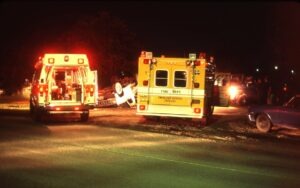What is a common disaster clause, and should I include it in my will?
Your will should cover any contingency. As we know, none of us can predict the future and events having the minimal likelihood of occurring do happen.
Since most couples designate each other as their primary beneficiary should one die, the estate of a deceased spouse usually passes automatically to the survivor.

But what happens when both have died at the same time or within minutes of each other? This situation is known as a “common disaster.”
Determining who died first can play heavily in determining how a combined estate should be divided. This problem often occurs when one or both partners come to the marriage with children from prior relationships and have chosen to name different secondary beneficiaries or percentages of the total benefit.
Simultaneous deaths without a common disaster clause in your will can lead to unintended outcomes.
Why is a Common Disaster Clause in Your Will Important?
When the assets are intertwined, couples usually designate their spouse as their primary beneficiary. As a result, determining who died first can become an essential factor.
For high net worth couples, for example, in second marriages with heirs on either or both sides, a common disaster clause can eliminate confusion, expense, and even unnecessary taxation.
For example, assume Brian and Antoinette have named different secondary beneficiaries or percentages of assets if one outlives the other. The typical sequence of events is that if Brian dies, the estate automatically passes to Antoinette. Later, when Antoinette dies, the estate then goes to her designated heirs.
But what if Brian and Antoinette die at the same time? Unless it can be discerned that one died before the other, each spouse’s estate would be distributed as if they had outlived the other.
A common disaster clause in a will or insurance policy can:
- Define how assets should be divided in the event of simultaneous death.
- Designate who “died first” in the event the time of death was not able to be determined. This directive would shift the estate to the side of the “survivor” automatically.
- Establish a survivor period, say 120 hours or more, that prevents the estate from immediately shifting to the survivor even when death is imminent. A second shifting of the estate to that person’s beneficiaries when they die can result in double taxation and unnecessary paperwork.
Uniform Simultaneous Death Act
The Uniform Simultaneous Death Act, adopted in nineteen states currently and used as a guideline in most others, was created primarily to identify the heirs of couples who die simultaneously intestate or without a will.
In these instances, “simultaneous” deaths are still indicated if the surviving spouse does not survive beyond 120-hours following the passing of the first spouse. The 120-hour rule eliminates the previously mentioned “double-shift” of assets.
Should the surviving spouse endure beyond 120-hours, the estate would go directly to the survivor.
Adding a Common Disaster Clause to Your Will with Expert Legal Advice
Tragically, the simultaneous deaths of both spouses does occur, often resulting from auto accidents, extreme weather situations, fires, aviation crashes, and other unforeseen incidents. What would happen to your assets should this occur is a serious and potentially complicated matter.
Your Will should address the possibility of simultaneous deaths and incorporate instructions for how your estate should be handled in case such a disaster should occur.
Contact an experienced estate lawyer who can advise you about ensuring your wishes will be fully addressed if a common disaster occurs.
In northern New Jersey, you should consult with the Law Office of Nicholas A. Giuditta III in Westfield to discuss your Will, review your concerns, and address the importance of adding a Common Disaster Clause.
To schedule an initial consultation about adding a common disaster clause to your Will, phone the Law Office of Nicholas A. Giuditta III at (908)-232-0099, or visit the Contact Us page of our website and leave a message.
 Experienced Wills and Estates Lawyer helping clients create estate plans
Experienced Wills and Estates Lawyer helping clients create estate plans